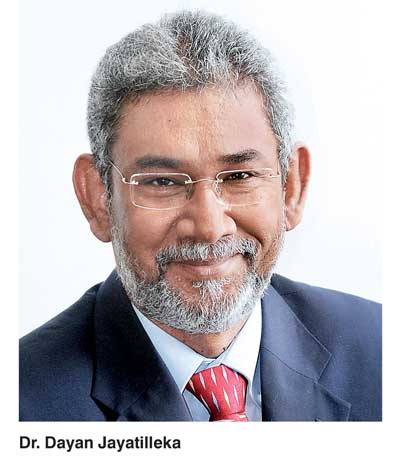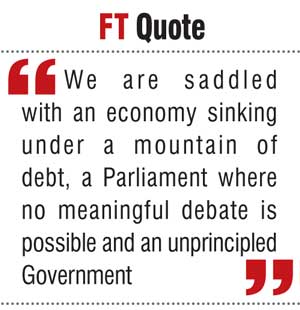Monday Feb 16, 2026
Monday Feb 16, 2026
Friday, 26 August 2016 00:05 - - {{hitsCtrl.values.hits}}
 Confusing friend and foe with right and wrong is an occupational hazard of partisan commentators. Dr. Dayan Jayatilleka is no exception to the rule. Despite the voluntary stepping on a discursive banana skin, his latest essay ‘Politics – post-Paada Yathra – from here to 2020’, delivers some startlingly uncomfortable home truths to those in power.
Confusing friend and foe with right and wrong is an occupational hazard of partisan commentators. Dr. Dayan Jayatilleka is no exception to the rule. Despite the voluntary stepping on a discursive banana skin, his latest essay ‘Politics – post-Paada Yathra – from here to 2020’, delivers some startlingly uncomfortable home truths to those in power.
As the ideologue of the Joint Opposition, he has decided to mentor his charges in the role of a Clausewitz and drawn a strategy map for them. It was von Clausewitz who said: “Engagements mean fighting. The object of fighting is the destruction or defeat of the enemy.” It was also Clausewitz who warned that theories become infinitely more difficult as soon as “they touch the realm of moral values”.
Dr. Jayatilleka earns the admiration of this writer for his unvarnished contempt for moral integrity in political combat. He is well informed of the enormity of the crisis that confronts the nation and the Government.
Crisis of governance
We are saddled with an economy sinking under a mountain of debt, a Parliament where no meaningful debate is possible and an unprincipled Government.
 The leading English weekend broadsheet in a recent editorial summed up the crisis of governance by the Sirisena-Wickremesinghe consociation with agonising clarity: “Politicians, past and present, are playing with fire using the debt card to attack each other as the country slides down the slippery slope of a debt trap. Then, the Government places the future of the country in the hands of a secretive few, some with vested interests, accusing others of destabilising the country’s economy when they are doing just that by themselves.”
The leading English weekend broadsheet in a recent editorial summed up the crisis of governance by the Sirisena-Wickremesinghe consociation with agonising clarity: “Politicians, past and present, are playing with fire using the debt card to attack each other as the country slides down the slippery slope of a debt trap. Then, the Government places the future of the country in the hands of a secretive few, some with vested interests, accusing others of destabilising the country’s economy when they are doing just that by themselves.”
The Editor of the most widely-read English Sunday newspaper was echoing widely-held and broadly expressed public disgust.
Scorched earth policy
So Dr. Dayan Jayatilleka does not need to exert himself. With detached calm, he explores the minefield that the Government has to traverse in the coming months. He is acutely aware of the malaise, the pain and the cure.
His suggestion is what any general would make on discovery of an open flank on the opposite side. But, he wants a scorched earth policy. He wants the Opposition to combine economic disruption and ethnic discord as their primary targets. He makes it abundantly clear to all that the sole purpose of the Paada Yathra was to restore Rajapaksa rule and/or to thwart investigations into their barefaced frauds and outright embezzlements.
He offers options: “…The more you resort to economic cut backs, the less you can concede on either accountability or ethnic autonomy, because you are dealing with growing numbers of disaffected people from the majority community.”
 Then he twists the blade: “Indeed the more you push economic shock therapy together with ethnic devolution, the more you risk a backlash. The more you combine economic shock therapy, ethnic devolution and wartime accountability into a cocktail and shake it, the more likely it is to become incendiary.”
Then he twists the blade: “Indeed the more you push economic shock therapy together with ethnic devolution, the more you risk a backlash. The more you combine economic shock therapy, ethnic devolution and wartime accountability into a cocktail and shake it, the more likely it is to become incendiary.”
Stratocracy vs. faulty democracy
Dr. Dayan Jayatilleka is undoubtedly a bright political scientist. He is adequately versed in Foucault’s theory of subtle and stealthy power to know the difference between the stratocracy that ended on 8 January 2015 and the faulty democracy that replaced it.
Systemic abuse of power, meekly accepted by an intimidated people, has been replaced by a not-so-infrequent misuse of power. The difference is that today an empowered people talk about it and freely express their disgust.
Dr. Dayan J makes several Faustian pronouncements. The first is simple, straightforward and beyond dispute. The Government of the Rajapaksa brothers did not understand the external realities.
The second assertion by the ideologue of the Rajapaksa Restoration movement is complicated by his palpable prejudices. Yet his core argument has cogency. He says that the present Government does not understand the domestic realities. The dual power centres makes it partially true. The President is very much alive to domestic realities. His Prime Minister is either oblivious to it or confident that domestic realities or disagreements could be managed, altered and redefined.
The third home truth is real, clear and substantially accurate. When stripped of the tortuous logic, what Dr. Jayatilleka suggests is that public discontent over harsh economic measures of the Government has the potential to derail constitutional reforms and perhaps even precipitate a collapse of the Government.
To this end he tells the Joint Opposition that it must flood the courts with petitions. It must launch public campaigns of protest on the streets and in the social media on these issues, bearing in mind that the decisive battle will be the Referendum on the Constitution.
He is not concerned with what the new Constitution contains. The referendum should reject it and cause the fall of the Government. The idea is not farfetched.
The problem with this Government
The problem with this Government is that the most vital functions of the Government are in the hands of people whose loyalties to the Prime Minister are beyond all doubt. So are their debilities, weaknesses and frailties. In the age of information, the subject has been assigned to an exceptionally inarticulate person who thinks that the role of the Ministry of Mass Media is to locate gatekeepers at every level of the Ministry.
Private electronic media by the simple expedient of presenting a cleverly circumspect contrary point of view claims independence and impartiality. Rupavahini and ITN with awkward attempts at concealing their organ grinders eminently succeed in portraying their baboonish talents. In the learned opinion of the Prime Minister, the public discussion of the issue of bonds by the Central Bank constitutes “irresponsible reporting” by a press bent on damaging the economy.
Opposition Parliamentarians are arrested, remanded and released with TV channels showing routine clips of indignant Opposition politicians accusing the Government of a deliberate political witch-hunts. Parliamentarians Bandula Gunawardene and Udaya Gammanpila, whose mastery of the Sinhala idiom is unparalleled, have discovered a contemporary actuality that has escaped the Government’s media handlers Gayantha Karunatileke and Karunarathne Paranawithane.
Any regular viewer of television news will tell the Government’s media experts that Government Ministers and the Prime Minister come off as relatively ham-handed in comparison to prominent Opposition Parliamentarians who have nurtured a symbiotic relationship with mainstream media channels.
Electronic media presents current affairs in a form that hardly distinguishes news and entertainment. The increasing focus is on one-on-one interviews and panel discussions. Wimal Weerawansa, Udaya Gammanpila and even the portly ‘Raththaran’ are no match for the Prime Minister’s light-weights Akila Viraj, Sagala, and Gayantha. If Malik Samarawickrama is in command of his assigned portfolio, he has displayed his genius by camouflaging it.
The gatekeeping functions of media outlets at the time of the illustrious father of the Prime Minister are of no relevance in these confrontational encounters. The role of the media in a democratic society is to reflect the common sense of the ordinary citizen and not to pander to the archaic assumptions of the elite in politics and commerce.
The Rajapaksa machine remains intact with their continued grip of the multiple axes of the State. It can still influence the fundamental structures that wield economic and political power.